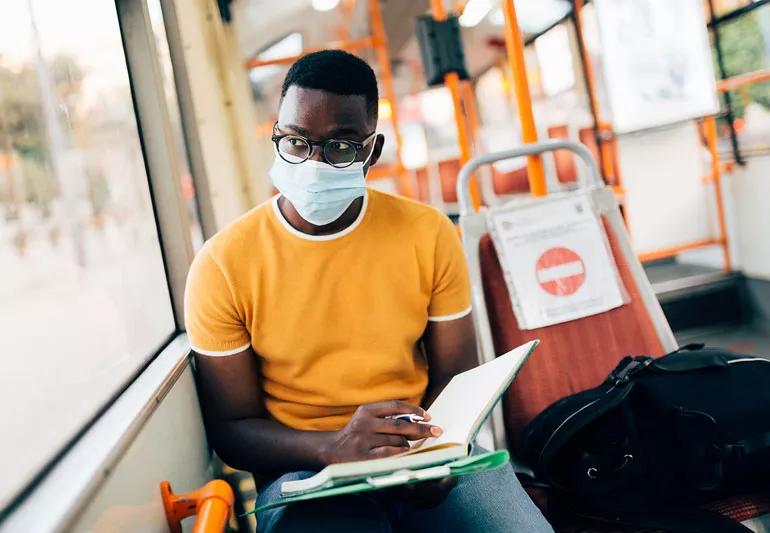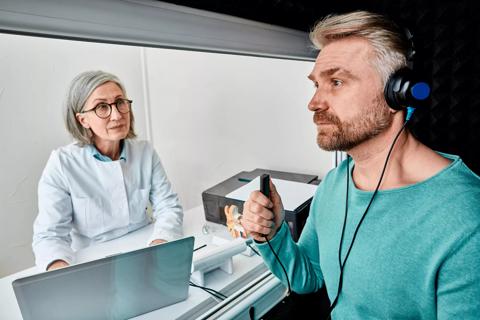Advertisement
Extra precautions can help prevent the spread of COVID-19

Usually, when college students make the trip home for a holiday or winter break, they look forward to catching up with family they haven’t seen in a while and reuniting with old friends. But, as we all know, this year is anything but usual.
Advertisement
Cleveland Clinic is a non-profit academic medical center. Advertising on our site helps support our mission. We do not endorse non-Cleveland Clinic products or services. Policy
Instead, as the holiday 2020 season nears, many college students face a dilemma: They want to be home for the holidays, but they also don’t want to risk bringing COVID-19 home with them.
Whether students stay put on campus or come home is a personal decision that will be different for each family. If they do come home, they should do so carefully.
Healthy young adults generally aren’t at high risk for getting extremely sick with COVID-19. But pulmonary and critical care specialist Joseph Khabbaza, MD, says students attending classes in person may fall into a higher risk category of being carriers and spreaders of COVID-19.
“Anyone who’s in full-time school, that’s going to be a bit higher risk,” he says. “I think part of the challenges of school-age children and young adults in college is that they tend to be the ones that are going to be minimally symptomatic if they are infected with COVID-19.”
Both the process of traveling and the coming together of separate “households” increase the risk that COVID-19 could spread. Following the steps below could help minimize the risk.
To reduce the potential of unknowingly spreading the coronavirus, students should limit their social activities 7 to 14 days before going home.
They should also be on the lookout for any potential COVID-19 symptoms such as fever, cough or body aches. If their school offers COVID-19 testing, it’s a good idea for students to get tested a few days before they leave for break and, if they’re positive, stay put to avoid putting others at risk.
If students will be traveling through busy airports, train stations or other public places, it’s very important that they stay cautious. They should always wear a mask, stay 6 feet away from others when possible and wash their hands frequently.
Once they arrive, students who have not been able to quarantine before returning home should wear a mask indoors, especially around loved ones who are elderly or have a compromised immune system.
“That’s a tough sell to wear a mask at family gatherings, or perhaps in your own home, but it’s really an extra precaution to protect the most vulnerable,” says Dr. Khabbaza.
If possible, it’s best for students to sleep in a separate bedroom and use a separate bathroom from others once they get home. They should also avoid sharing eating utensils, dishes or glasses with other people unless they’ve been washed.
It’s also important that they continue to take the recommended precautions when they go out in public.
By making thoughtful choices, college students can help protect their loved ones and themselves this holiday season.
Advertisement
Learn more about our editorial process.
Advertisement

The medication is ineffective and — in the case of animal ivermectin — potentially dangerous

Updated vaccinations are recommended to better protect against the evolving virus

Enteroviruses are often to blame for summer colds, leading to a runny nose, sore throat and digestive symptoms

Redness, swelling, itching and rash can happen when your body’s immune system reacts to the vaccine injection

Studies suggest 1 in 5 people infected with the coronavirus never develop symptoms

An increased risk of blood clots can last for nearly a year after a COVID-19 diagnosis

COVID-19 may be associated with tinnitus, but research is still ongoing

The short answer: It’s complicated, but the basic care precautions still prevail, like washing your hands and isolating if you’re sick

Focus on your body’s metabolic set point by eating healthy foods, making exercise a part of your routine and reducing stress

PFAS chemicals may make life easier — but they aren’t always so easy on the human body

While there’s little risk in trying this hair care treatment, there isn’t much science to back up the claims